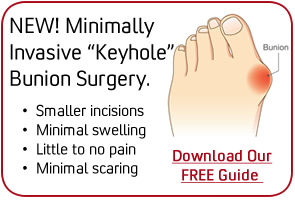|
Why Does the Doctor Want to Put Screws in My Foot
In a great number of bone procedures of the foot and ankle, your doctor many tell you that they are going to fix the bone with screws to hold them in place. Screws are used to secure two bones or bone fragments together to allow for compression of the bone to promote healing. This not much different than when you screw two pieces of wood together to hold them in place. This compression of bone helps to secure the bone together to produce what is known as primary bone healing. This type of healing is different from secondary bone healing, in that secondary bone healing producers a bone callus while primary bone healing does not. Complete bone healing typically takes 6 to 8 weeks, but may take longer in some cases. Screws also allow for immediate weight bearing in some procedures after surgery or for movement of your foot and ankle to regain strength in your muscles, particularly after a fracture. These screws are made out of either a high-grade surgical stainless steel or titanium. Screws used in the foot range in sizes from 1.5 mm to 7.3 mm in size and have many different applications from fixation of fractures to arthrodesis procedures. One of the most commonly asked questions is Will the screws set off metal detectors? The answer is no. These screws are non-magnetic and will not set off metal detectors. Additionally, you with not pick up radio waves. These statements are myths and have no relevance. In having these types of screws in your foot, you can also have a MRI test with complete safety. Another commonly asked question is whether the screws need to be removed. The answer is maybe. Most screws do not need to be removed unless the screws are have come loose, are causing irritation or you want them removed. In the majority of cases, the screw does not need to be removed and can stay in your foot or ankle forever. There is only one thing that you need to inform your doctor about if they state they are going to use screws. If you have an allergy to jewelry or metal, particularly silver or costume jewelry, you need to inform your doctor about this before surgery. This is very important because some screws contain nickel, which is a common component of costume and some silver jewelry. If you have a true allergy to nickel or stainless steel, an allergy patch test may need to be performed to determine if you are allergic to titanium. Article provided by PodiatryNetwork.com.
|










